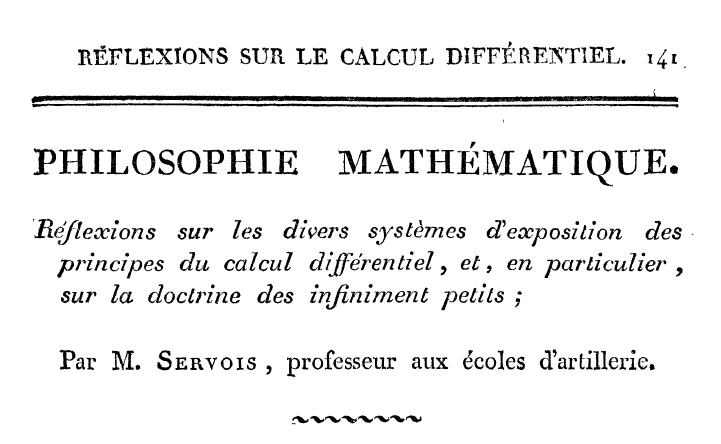- About MAA
- Membership
- MAA Publications
- Periodicals
- Blogs
- MAA Book Series
- MAA Press (an imprint of the AMS)
- MAA Notes
- MAA Reviews
- Mathematical Communication
- Information for Libraries
- Author Resources
- Advertise with MAA
- Meetings
- Competitions
- Programs
- Communities
- MAA Sections
- SIGMAA
- MAA Connect
- Students
- MAA Awards
- Awards Booklets
- Writing Awards
- Teaching Awards
- Service Awards
- Research Awards
- Lecture Awards
- Putnam Competition Individual and Team Winners
- D. E. Shaw Group AMC 8 Awards & Certificates
- Maryam Mirzakhani AMC 10 A Awards & Certificates
- Two Sigma AMC 10 B Awards & Certificates
- Jane Street AMC 12 A Awards & Certificates
- Akamai AMC 12 B Awards & Certificates
- High School Teachers
- News
You are here
Servois' 1814 Essay on the Principles of the Differential Calculus, with an English Translation - Differentials via Series
Servois began the “Reflections” with a philosophical justification of the research he had conducted in his “Essay” [Servois 1814a]. He began by stating that it is not necessary to consider only one primary foundation for calculus; however, the foundation selected must be rigorous. Servois was primarily speaking against the use of infinitesimals as a foundation for the differential calculus. The infinitesimal calculus, according to Servois, cannot rigorously answer the following questions:
- What is a differential?
- When and how do differentials arise naturally?
- With which analytic functions do they maintain intimate connections, not just simple analogies?
Servois argued that these questions can be answered using the Lagrangian method. He stated that the idea of using series as a foundation for calculus is natural because students are exposed to series early in their education when performing long division or extracting roots, in which the idea of series is an underlying principle. Thus, “series and the differential calculus, therefore ought to arise together” [Servois 1814b, p. 142]. In his “Essay” [Servois 1814a], Servois had defined the differential ( dz ) by the series: \[ \Delta z - \frac{1}{2} \Delta^2 z + \frac{1}{3} \Delta^3 z - \frac{1}{4} \Delta^4 z + \ldots, \] a definition he recapitulated in the “Reflections.” By analogy, Servois observed that the differential is like the logarithm of the varied state, i.e. \( \ln(z + \Delta z) \). (In his “Essay,” Servois had defined the varied state of \( \phi(x, y, \ldots) \) to be \( \phi(x + a, y + b, \ldots) \), for arbitrary constants \( a, b, \ldots \) [Servois 1814a, p. 94].) Servois then claimed that all the rules of the differential calculus can be proven using this series and the distributive and commutative properties of the varied state, the difference operator, and multiplication by a constant. Indeed, he had deduced all of these properties in his “Essay."

Figure 4. Title page of Servois’ “Reflections” (public domain).
Robert E. Bradley (Adelphi University) and Salvatore J. Petrilli, Jr. (Adelphi University), "Servois' 1814 Essay on the Principles of the Differential Calculus, with an English Translation - Differentials via Series," Convergence (November 2010), DOI:10.4169/loci003487




